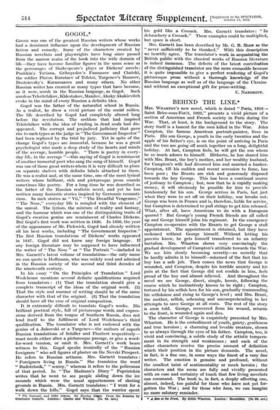GOGOL.* G000t was one of the greatest Russian writers whose
works had a dominant influence upon the development of Russian fiction and comedy. Some of the characters created by Russian novelists and playwrights have long since passed from the narrow realm of the book into the wide domain of life—they have become familiar figures' in the same sense as the personages of Shakespeare's plays or Dickens' novels : Pushkin's Tatiana, Griboyedov's Famussov and Chatski, the soldier Platon Karataev of Tolstoi, Turgenev's Bazarov, Dostoievsky's Karamazovs and many others. No other Russian writer has created as many types that have become, as it were, words in the Russian language, as Gogol. Such words as Tchritchikov, Kldestakov, Manilov, Akaky Akakievitch evoke in the mind of every Russian a definite idea.
Gogol was the father of the naturalist school in Russia. As a realist, he drew a vivid picture of the social milieu. The life described by Gogol had completely altered long before the revolution. The serfdom that had inspired Tchitchikov with the idea of trading in dead souls had dis- appeared. The corrupt and prejudiced judiciary that gave rise to such types as the judge in "The Government Inspector" had been replaced by the trial by jury. Yet in spite of the change Gogol's types are immortal, because he was a great psychologist who made a deep study of the hearts and minds of the average, -humble people. "There is poetry in every- day life, in the average "—this saying of Gogol is -reminiscent of another immortal poet who sang the song of himself. Gogol was one of those great writers whom it is very difficult to place on separate shelves with definite labels attached to them. He was a realist and, at the same time, one of the most lyrical writers whose brilliant, rich and picturesque prose sounds sometimes like poetry. For a long time he was described as the father of the Russian realistic novel, and yet he has written many fantastic stories inspired by Germanic romanti- cism. In such stories as "Vii," "The Dreadful Vengeance," "The Nose," everyday life is mingled with the element of the unreal. The lyrism, the mixture of reality and fantasy, and the humour which was one of the distinguishing traits of Gogol's creative genius are reminiscent of Charles Dickens. But Gogol's first work was written in 1830. In 1836, the year of the appearance of Mr. Pickwick, Gogol had already written all his best works, including "The Government Inspector." The first Russian translations of Dickens' works appeared in 1847. Gogol did not know any foreign language. If any foreign literature may be supposed to have influenced the writer of "The Nose" or "The Portrait "—included in Mrs. Garnett's latest volume of translations—the only name we can quote is Hoffmann, who was widely read and admired in the Russian society of the second and third decades of the nineteenth century.
In his essay "On the Principles of Translation" Lord Wodehouse mentions several definite qualifications required from translators : (1) That the translation should give a complete transcript of the ideas of the original work. (2) That the style and manner of writing should be of the same character with that of the original. (3) That the translation should have all the ease of original composition.
It is extremely difficult to translate Gogol's works. His brilliant poetical style, full of picturesque words, and expres- sions derived from the tongue of Southern Russia, does not lend itself to the fulfilment of Lord Wodehouse's third qualification. The translator who is not endowed with the genius of a Jukovski or a Turgenev—the authors of superb Russian translations of Schiller and Flaubert respectively— must needs either alter a picturesque passage, or give a word- for-word version, or omit it. Mrs. Garnett's work bears witness to this. Gogol speaks ironically of the "Russian foreigners " who sell figures of plaster on the Nevski Prospect. He refers to Russian artisans. Mrs. Garnett translates : "Foreigners living in Russia." She translates the word " Budotchnik," "sentry," whereas it refers to the policeman of that period. In "The Madman's Diary" Popristchin writes that he went to see people sliding down the ice mounds which wene the usual appurtenance of skating grounds in Russia. Mrs. Garnett translates : "I went for a walk down the hills." Gogol says that the warrior spent
• The Overcoat, and Oilier Stories. By Nicolay Gogol. From the Russian by
Constance Garnett. London 1 Matto and Wiedue. -dd. net.]
his gold like a Cossack. Mrs. Garnett translates : "In debauchery a Cossack." These examples could be multiplied, but space is short.
Mrs. Garnett has been described by Mr. G. B. Shaw as the "never sufficiently to be thanked." With this description we heartily agree. The translator's work in .acquainting the British public -with the classical works of Russian literature is indeed immense. The defects of the latest contribution of the distinguished translator are the more excusable because it is quite impossible to give a -perfect rendering of Gogol's picturesque prose without a thorough knowledge of the Russian language -as well as of the language of the Ukraine and without an exceptional gift for prose-writing.
C. NAnomatv.


























































 Previous page
Previous page